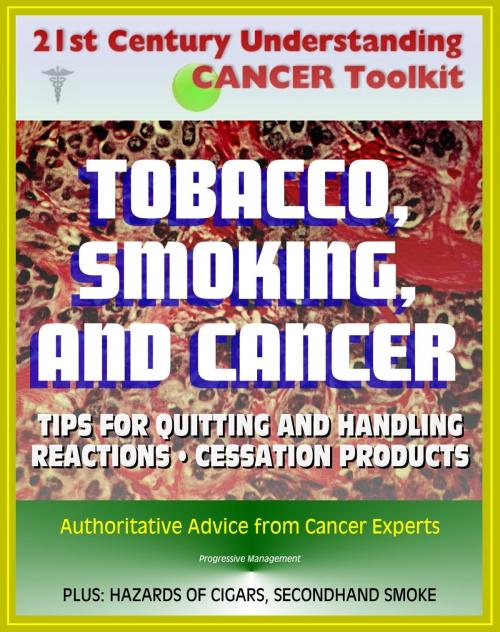21st Century Understanding Cancer Toolkit: Tobacco, Smoking, and Cancer - Tips for Quitting, Handling Reactions, Cessation Products, Secondhand Smoke, Cigars, Smokeless Tobacco, Lung and Oral Cancer
Nonfiction, Health & Well Being, Psychology, Addictions, Health, Ailments & Diseases, Cancer| Author: | Progressive Management | ISBN: | 9781458092885 |
| Publisher: | Progressive Management | Publication: | February 8, 2011 |
| Imprint: | Smashwords Edition | Language: | English |
| Author: | Progressive Management |
| ISBN: | 9781458092885 |
| Publisher: | Progressive Management |
| Publication: | February 8, 2011 |
| Imprint: | Smashwords Edition |
| Language: | English |
Authoritative information and practical advice from the nation's cancer experts about tobacco, smoking, and cancer - including extensive tips for quitting and handling the negative reactions associated with stopping smoking, smoking cessation products, the hazards of secondhand smoke, cigars, and smokeless tobacco, plus background information on lung and oral cancer. Conveniently organized contents include: Part One: Tobacco, Smoking, Cancer, and Health
Overview of Tobacco and Health * Smoking Cessation Products * The Great American Smokeout * Pregnant? Don't Smoke! Learn How and Why to Quit for Good * Lung Cancer Awareness * Women and Smoking * Lung Cancer Prevention * Oral Cancer Prevention * Cancer and the Environment * Part Two: Quitting Tobacco - Tips and Ideas * Handling Cravings … Without Smoking * Quitting Tobacco: Handling Irritability and Frustration … Without * Quitting Tobacco: Handling Stress … Without Smoking * Quitting Tobacco: Handling Anxiety … Without Smoking * Quitting Tobacco: Handling Depression … Without Smoking * Quitting Tobacco: Facing the Morning … Without Smoking * Quitting Tobacco: Facing Boredom … Without Smoking * Quitting Tobacco: Driving or Riding in a Car … Without Smoking * Quitting Tobacco: Being Around Other Smokers … Without Smoking * Quitting Tobacco: Enjoying Meals … Without Smoking * Quitting Tobacco: Enjoying Coffee and Tea … Without Smoking * Quitting Tobacco: Having a Drink … Without Smoking * Quitting Tobacco: Short-term and Long-term Health Benefits * Smokeless Tobacco and Cancer: Questions and Answers * Secondhand Smoke: Questions and Answers * The Truth About “Light” Cigarettes: Questions and Answers * Cigar Smoking and Cancer. Tobacco use can lead to nicotine dependence and serious health problems. Cessation can significantly reduce the risk of suffering from smoking-related diseases. Tobacco dependence is a chronic condition that often requires repeated interventions, but effective treatments and helpful resources exist. Smokers can and do quit smoking. In fact, today there are more former smokers than current smokers. Nicotine Dependence - Nicotine is the psychoactive drug in tobacco products that produces dependence. Most smokers are dependent on nicotine. Nicotine dependence is the most common form of chemical dependence in the United States. Research suggests that nicotine is as addictive as heroin, cocaine, or alcohol. Quitting smoking is difficult and may require multiple attempts. Users often relapse because of stress, weight gain, and withdrawal symptoms. Examples of nicotine withdrawal symptoms include irritability, anxiety, difficulty concentrating, and increased appetite. Health Benefits of Cessation - Breaking free from nicotine dependence is not the only reason to quit smoking. Cigarette smoke contains at least 250 chemicals known to be toxic or carcinogenic (i.e., cause cancer). Cigarette smoke can cause serious health problems, numerous diseases, and death. Fortunately, people who stop smoking greatly reduce their risk for disease and premature death. Although the health benefits are greater for people who stop at earlier ages, cessation is beneficial at all ages. Smoking cessation is associated with the following health benefits: Smoking cessation lowers the risk for lung and other types of cancer. Smoking cessation reduces the risk for coronary heart disease, stroke, and peripheral vascular disease. Coronary heart disease risk is reduced within 1 to 2 years of cessation.
Authoritative information and practical advice from the nation's cancer experts about tobacco, smoking, and cancer - including extensive tips for quitting and handling the negative reactions associated with stopping smoking, smoking cessation products, the hazards of secondhand smoke, cigars, and smokeless tobacco, plus background information on lung and oral cancer. Conveniently organized contents include: Part One: Tobacco, Smoking, Cancer, and Health
Overview of Tobacco and Health * Smoking Cessation Products * The Great American Smokeout * Pregnant? Don't Smoke! Learn How and Why to Quit for Good * Lung Cancer Awareness * Women and Smoking * Lung Cancer Prevention * Oral Cancer Prevention * Cancer and the Environment * Part Two: Quitting Tobacco - Tips and Ideas * Handling Cravings … Without Smoking * Quitting Tobacco: Handling Irritability and Frustration … Without * Quitting Tobacco: Handling Stress … Without Smoking * Quitting Tobacco: Handling Anxiety … Without Smoking * Quitting Tobacco: Handling Depression … Without Smoking * Quitting Tobacco: Facing the Morning … Without Smoking * Quitting Tobacco: Facing Boredom … Without Smoking * Quitting Tobacco: Driving or Riding in a Car … Without Smoking * Quitting Tobacco: Being Around Other Smokers … Without Smoking * Quitting Tobacco: Enjoying Meals … Without Smoking * Quitting Tobacco: Enjoying Coffee and Tea … Without Smoking * Quitting Tobacco: Having a Drink … Without Smoking * Quitting Tobacco: Short-term and Long-term Health Benefits * Smokeless Tobacco and Cancer: Questions and Answers * Secondhand Smoke: Questions and Answers * The Truth About “Light” Cigarettes: Questions and Answers * Cigar Smoking and Cancer. Tobacco use can lead to nicotine dependence and serious health problems. Cessation can significantly reduce the risk of suffering from smoking-related diseases. Tobacco dependence is a chronic condition that often requires repeated interventions, but effective treatments and helpful resources exist. Smokers can and do quit smoking. In fact, today there are more former smokers than current smokers. Nicotine Dependence - Nicotine is the psychoactive drug in tobacco products that produces dependence. Most smokers are dependent on nicotine. Nicotine dependence is the most common form of chemical dependence in the United States. Research suggests that nicotine is as addictive as heroin, cocaine, or alcohol. Quitting smoking is difficult and may require multiple attempts. Users often relapse because of stress, weight gain, and withdrawal symptoms. Examples of nicotine withdrawal symptoms include irritability, anxiety, difficulty concentrating, and increased appetite. Health Benefits of Cessation - Breaking free from nicotine dependence is not the only reason to quit smoking. Cigarette smoke contains at least 250 chemicals known to be toxic or carcinogenic (i.e., cause cancer). Cigarette smoke can cause serious health problems, numerous diseases, and death. Fortunately, people who stop smoking greatly reduce their risk for disease and premature death. Although the health benefits are greater for people who stop at earlier ages, cessation is beneficial at all ages. Smoking cessation is associated with the following health benefits: Smoking cessation lowers the risk for lung and other types of cancer. Smoking cessation reduces the risk for coronary heart disease, stroke, and peripheral vascular disease. Coronary heart disease risk is reduced within 1 to 2 years of cessation.















